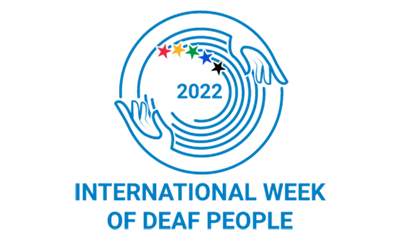A reflection by Vanessa Cumper, PGR in FASS

International Week of Deaf People has happened every year since 1958, though I guess it just passes silently by most people. Another event I am sure you have never heard of is the Deaflympics, held every four years since 1924 (Paris). A little known fact; Deaflympics is the oldest multi-sporting event after the Olympic Games; the Paralympics didn’t start until 1960, in case you were wondering. What have we been missing?
Each day of International Week of Deaf People has its own theme, which can be found here https://wfdeaf.org/iwdeaf2022/. The most notable is Friday, 23rd September: Sign Languages Unite Us! There has been much talk of sign languages (UK) of late, especially since actor Rose Ayling-Ellis won Strictly Come Dancing. Marvel comics changed one of their white male characters, Makkari, into a woman of colour played by the actor Lauren Ridloff, who is deaf and an American Sign Language (ASL) user. Barbie are releasing a fashionista doll with hearing aids this month, and a bill to officially recognise British Sign Language (BSL) went through parliament, obtaining Royal Ascent. This last is incredibly important, though no-one knows quite what this will actually mean – the Government is still working out the details.
As you may have realised, there are many different sign languages. Every country in the world has at least one form of native sign language, unique to them. Some are endangered and some have been lost altogether – Martha’s Vineyard for example. As with any language, signed languages are complex, with their own grammar and lexicon. Do not let that put you off learning, though! It is fun and easy to learn, in small manageable chunks. The University of Surrey offers BSL as part of their Global Graduate Awards language courses; find out more here: https://www.surrey.ac.uk/student-life/get-involved/learning-opportunities.
Its only taken me to get to the fourth paragraph to tell you why International Week of Deaf People is important to me. I wear hearing aids in both ears. I have often been excluded and spoken to as if I am child. The horrible treatment I received during my masters could have broken me and made me quit. I’m proud to say that it didn’t – instead it drove me on to conduct research. I bumped into my now supervisor, chatting with her about the direction I would like to take my research. She was so inspirational and gave me such a boost, I now find myself at University of Surrey, researching how technology can be used to facilitate access for people who are D/deaf, at museums and galleries. We have some wonderful mobile eye-tracking glasses, which I am grateful I have been able to borrow, to give me an insight into the perspective of a person who is D/deaf. Which is novel, by the way. You may also be wondering what this ‘D/deaf’ is I keep writing, I keep writing. Well, the capital letter D denotes people who are congenitally Deaf, are part of the Deaf community and use sign language. The lower-case d are all the people who do not identify as belonging to the Deaf community. These people may have hearing loss due to age, illness or loud music. Watch A Star is Born with Lady GaGa – one of the characters is losing his hearing due to too much loud rock music. Be warned, you will need tissues.
Despite all these exciting developments and increasing visibility of D/deaf people in our culture, there are still many challenges, including aspects of race. My research – as exciting as it has been – is whitewashed to be honest. Not by design, the participants just haven’t been diverse. And my research is not unique in that respect – I believe it is realistic to say that 98% of research on people who are D/deaf is on European or white Americans. Even though I read an interesting article[MR1] that stated people who are white are more likely to be congenitally Deaf, this imbalance is much more likely cultural. People who live in developing countries succumb to childhood illnesses causing hearing loss, the reason being inaccessible healthcare.
What can I do about this? Excitingly, I have the opportunity to travel to South Africa, hosted by the University of Johannesburg, and the art gallery within the University of Witwatersrand. This is a unique opportunity to gather credible data on a much more diverse population. In many respects South Africa are leading the way for D/deaf rights. The South African government have put in place incentives for employers to engage people who are D/deaf on a permanent basis. People who are D/deaf gain employment and dignity, while the employer benefits from a diverse workforce. Furthermore, SASL has been on their school curriculum since 2015, something that we are still battling for in the UK.
[MR1]Got a link to this article?
